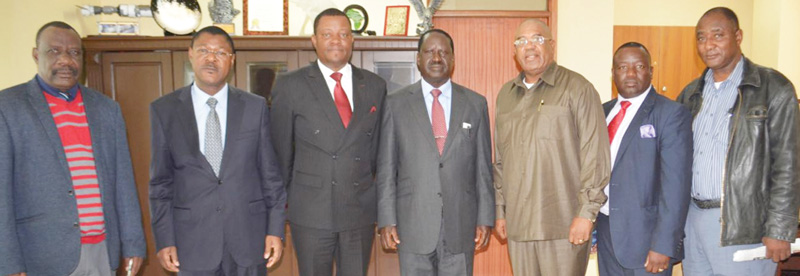
Gender mainstreaming crucial in policy implementation

Giving their views on gender issues are, from the left, Hon. Rejoice Mabudafhasi, Deputy Minister of Water and Environment, South Africa, Deputy Chairperson of the National Council, Margaret Mensah-Williams, Hon. Rosalia Nghidinwa, Minister of Gender Equality and Child Welfare and Finnish Ambassador, Her Excellency Anne Saloranta. (Photograph by Hilmah Hashange)Giving their views on gender issues are, from the left, Hon. Rejoice Mabudafhasi, Deputy Minister of Water and Environment, South Africa, Deputy Chairperson of the National Council, Margaret Mensah-Williams, Hon. Rosalia Nghidinwa, Minister of Gender Equality and Child Welfare and Finnish Ambassador, Her Excellency Anne Saloranta. (Photograph by Hilmah Hashange)
The role of women in decision making in particular, plays an important role in successfuly implementing policies that support development.
According to latest statistics by the Namibia Statistics Agency, 67% of people live in the rural areas and therefore depend on the natural environment for food. A majority of these are women and although they produce half of the total amount of food, only a small percentage of these women actually own land.
However, data by the Food and Agriculture Organisation (FAO) in 2012, revealed that the empowerment of women could raise their farm productivity by 20% to 30% worldwide and increase national agriculture output by 2.5% to 4% , ultimately lifting 100 to 150 million people out of hunger.
Since its inception, the United Nations Convention to Combat Desertification (UNCCD) has recognised the role of women in ensuring sustainable livelihood by encouraging the equal participation of women in capacity building. In fact, the UNCCD is the only Rio Convention which has gender and women’s empowerment included in its convention text.
The UNCCD Advocay Policy Framework (APF) on gender which was approved by the tenth Conference of Parties (COP10), demonstrates the benefits of mainstreaming gender in Desertification, Land Degradation and Drought as well as Sustainable Land Management at national and local level.
The framework recognised that gender mainstreaming has to take place at various levels involving multiple stakeholders because it is only through the full participation of local people, especially women, that the efforts to combat desertification can become effective.
Namibia has prioritized to achieve its first, third and seventh Millenium Development Goals especially those that play a significant role for women in sustainable land management. These goals are eradication of extreme poverty and hunger, the promotion of gender equality and empowerment of women and ensuring environmental sustainability, respectively.
Despite the challenges that the country faces in terms of women’s access to land, participation in decion making and their contribution to sustainable land management, various policy frameworks have been put in place. These policies are imed at mitigating desertification, drought and ensuring sustainable land management.
According to Margret Mensah-Williams, Deputy Chairperson of the National Council, many of these policies are not implemented accordingly because the involvement of women is lacking. Making reference to the National Drought Policty of Namibia, Mensah-Williams said although the initiatives outlined in the policy are commendable, they can not be achieved if land reform is not aggresively addressed.
“When it comes to gender and women issues, the policy disappoints as it relates to women only as lactating mothers whose well-being needs to be looked after.It is important that we ensure that policy directives must transform lives of communities, in particular with relation to women. Any policy that is serious about mitigating drought, desertification and land degradation must have women empowerment as its core,” she added.
Mensah-Williams made the remaks during the Drylands Women’s Empowerment side event at the recent UNCCD COP11 held in Windhoek.










































